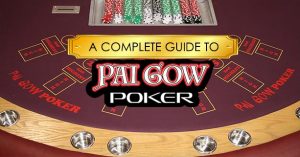
Pai Gow Poker is a card game based on the Chinese game Pai Gow. While the original game was played using a set of 32-dominoes, its current casino card game rules apply basic principles of the domino game to the poker deck.
Learn Pai Gow Poker rules and strategies by reading the below game introduction.
Pai Gow Poker Basics – Introduction
Pai Gow Poker basics state that players are dealt seven cards which they must divide into two hands, one of five-cards and one of two-cards. In splitting up the hands, the one rule players must follow is that the 5-card hand must be better than the 2-card hand (e.g. if you have only one pair, it must go in the 5-card hand). Players then showdown against the banker, who is either the casino dealer or a player. If both of the player’s hands beat the banker’s corresponding 5 and 2-card hands, the player wins.
However, when two hands are equal, Pai Gow Poker’s casino card game rules stipulate that the tie go to the banker. This isn’t common with the 5-card hand, but can happen quite often with the two card hand. If both player and banker win one each, the round is a push and the player takes back his initial bet. If the player loses both, of course, the banker wins all bets. If a player makes a mistake and his 2-card hand ranks higher than his 5-card hand, both player hands lose. Some casinos even charge a penalty for this, so watch out.
Pai Gow Poker employs a deck with 53 cards; the standard 52-card deck with the addition of a Joker. The Joker can be used as a wild to complete straights and flushes, but otherwise counts only as an ace. Thus, for all intents and purposes, there are 5 aces in the deck and straights and flushes are a little more likely. Also, don’t forget that the Joker can be used for straight flushes as well.
Pai Gow Poker Basics – Betting
Betting in Pai Gow Poker is fairly simple. The table at which you play will have a set minimum and maximum bet, and you must bet an amount within those confines on each hand. Once you’ve bet, you don’t need to wager anything else until the next hand. The house earns its profit by claiming a 5% rake on all player winnings. For example, if you bet $500 and won, the house would take out $25 for the rake and you would be left with $475 in winnings. This rake may seem high, especially to the low-percentage rakes used in Texas Hold’em, but with the frequency of pushes and lengthy duration of hands, the house does not collect on the rake nearly as often as it does in other raked games.
An alternative to the rake is charging a flat rate per hand, which is a more common practice in California brick and mortar casinos. In addition to the wager, each player must pay a charge of say, 25 cents, to play each hand, regardless of wins or losses. Thanks, however, to the high number of pushes in Pai Gow Poker, a flat rate can be a costly proposition. If you’re playing at this type of land casino or casino online, bet as close to the maximum as you can afford, otherwise the flat rate will take away a larger chunk of your winnings.
Pai Gow Poker Basics – Be the Banker
Pai Gow Poker rules make it one of the few table games that give you a chance to play against other players and the dealer. In most casinos, the banker will start out being randomly determined and will then proceed around the table. To be the banker, you must have enough money on the table to cover a maximum bet from each player. Aside from the high bankroll requirements, there are many advantages to being the banker, the first of which is that you win all ties between hands. This gives your two-card hands an especially strong edge.
Another benefit of being the banker is that the 5% rake is added to the net sum of your earnings, versus being paid per hand. For example, if you won two hands and lost two hands as the dealer, you would break even because your net earnings would be 0. Conversely, if the rake was applied to each hand, you would lose 5% off each winning hand, putting you in the red overall.
The point is, it pays to be the dealer. Keep this in mind when you sit down to the Pai Gow Poker table. Good luck!
